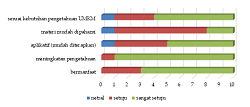Peningkatan Pengetahuan UMKM Pangan tentang Produk Pangan Bergizi, Aman, dan Halal Improving Knowledge of Food Nutritional Value, Safety, and Halal Aspects of Small and Medium Enterprises Food Products
Main Article Content
Abstract
As part of Micro, Small, and Medium Enterprises (MSMEs), the Culinary Sector is the sector that has the largest contribution to the National Gross Domestic Product at 32.50%. During the Covid-19 pandemic, the MSME business in the culinary industry showed positive growth with an increase in the number of enterprises and their transactions, especially with the internet-based marketing system (online). However, it still has several problems, such as low nutritional value, safety issues, and the product halalness. Tirtonirmolo, a subdistrict that houses 178 food MSMEs, is also experiencing the same problem with the low number of products certified for their safety and halal status. Educational programs were conducted to increase the knowledge of the household food industry in Tirtonirmolo by the principles of nutrition, food safety, and halalness. Through educational programs, knowledge improvement is carried out through an online meeting platform with three topics: improving nutritional food value, safety, and halal food products. Measurement of the increase in knowledge is done by comparing the results of the pre-test and post-test. The measurement results showed that there was an increase in knowledge scores in three aspects, namely nutrition (9.1 points), food safety (11.4 points), and food halalness (13.1 points), with an average of 11.4 points. From the evaluation results, it was found that most of the participants felt that this activity was valuable and applicable and had expectations for follow-up. This educational program can be designed to be carried out ongoing to obtain a more optimal result of increasing knowledge.
Downloads
Article Details
Authors who publish with this journal agree to the following terms:
- Any article on the copyright is retained by the author(s).
- Author grant the journal, right of first publication with the work simultaneously licensed under a Creative Commons Attribution License that allows others to share work with acknowledgment of the work authors and initial publications in this journal.
- Authors are able to enter into a separate, additional contractual arrangements for non-exclusive distribution of published articles of work (eg, post-institutional repository) or publish it in a book, with acknowledgment of its initial publication in this journal.
- Authors are permitted and encouraged to post their work online (e.g., in institutional repositories or on their websites) prior to and during the submission process, as can lead to productive exchanges, as well as earlier and greater citation of published work.
- The article and any associated published material is distributed under the Creative Commons Attribution-ShareAlike 4.0 International License
References
Akim, Konety, N., Purnama, C., Adilla, M.H. 2018. The Understanding of Usaha Mikro, Kecil Dan Menengah (UMKM) in Jatinangor on the Obligation of Halal Certification on Food Products. Kumawula: Jurnal Pengabdian Kepada Masyarakat. 1(1):31–49. https://doi.org/10.24198/kumawula.v1i1.19258
Andrio. 2018. Analisis Inovasi Berkelanjutan Pada Usaha Mikro, Kecil, Dan Menengah (UMKM) Industri Busana Muslim di Kota Bandung. Skripsi. Bandung: Universitas Katolik Parahyangan.
Karina, S.M., Amrihati, E.T. 2017. Bahan Ajar Gizi: Pengembangan Kuliner. 1st ed. Jakarta: Kementerian Kesehatan Republik Indonesia.
Manayang, Y., Joseph, W.B.S., Sumampouw, O.J. 2018. Higiene dan Sanitasi Industri Pangan Rumah Tangga di Wilayah Kerja Puskesmas Paniki Bawah. Kesmas : Jurnal Kesehatan Masyarakat Universitas Sam Ratulangi. 7(5):1-7.
Myhre, J.B. Løken, E.B., Wandel, M., Andersen, L.F. 2015. The contribution of snacks to dietary intake and their association with eating location among Norwegian adults - Results from a cross-sectional dietary survey. BMC Public Health. 15:369. https://doi.org/10.1186/s12889-015-1712-7
Pritanova, P.R., Muhandri, T., Nurjanah, S. 2020. Karakteristik dan Pemenuhan CPPOB Pelaku UMKM Online Produk Olahan Beku Daging Sapi dan Ayam di DKI Jakarta. Jurnal Ilmu Produksi dan Teknologi Hasil Peternakan. 8(3):102-108. https://doi.org/10.29244/jipthp.8.3.102-108
Putra, K.A.D., Hidayatullah, F., Farida, N. 2020. Mediatisasi Layanan Pesan Antar Makanan Di Indonesia Melalui Aplikasi Go-Food. Islamic Communication Journal. 5(1):114-124. https://doi.org/10.21580/icj.2020.5.1.5416
Rasyid, T.H. 2010. Raising the Awareness of Halal Product Among Indonesian Consumers: Issues and Strategies. Indonesian Journal of Agricultural Economics (IJAE). 1(1):19–38. http://dx.doi.org/10.31258/ijae.1.01.%25p
Sari, Y.D., Rachmawati, R. 2020. Kontribusi Zat Gizi Makanan Jajanan Terhadap Asupan Energi Sehari Di Indonesia (Analisis Data Survey Konsumsi Makanan Individu 2014) [Food Away From Home (Fafh) Contribution of Nutrition To Daily Total Energy Intake in Indonesia]. Penelitian Gizi dan Makanan (The Journal of Nutrition and Food Research). 43(1):29–40. https://doi.org/10.22435/pgm.v43i1.2891
Sartika, R.S. 2020. Keamanan Pangan Penyelenggaraan Makanan bagi Pekerja. Jurnal Gizi Kerja dan Produktivitas. 1(1):29–35. http://dx.doi.org/10.52742/jgkp.v1i1.10130
Sevitasari, D. 2012. Analisis Tingkat Keamanan Pangan Produk Olahan Hasil Pertanian Di Industri Pangan Skala Usaha Kecil dan Menengah (UKM) Kota Batu, UMM. Skripsi. Malang: Universitas Muhammadiyah Malang.
Suryana, A. 2014. Menuju Ketahanan Pangan Indonesia Berkelanjutan 2025: Tantangan Dan Penanganannya. Forum Penelitian Agro Ekonomi. 32(2):123-135. http://dx.doi.org/10.21082/fae.v32n2.2014.123-135
Wahyu. 2017. Emping Hijau Rendah Purin, Kuliner Inovatif dari Tirtonirmolo. https://tirtonirmolo.bantulkab.go.id/first/artikel/27-Emping-Hijau-Rendah-Purin--Kuliner-Inovatif-dari-Tirtonirmolo
Widyaningrum, R., Ramadhani, K., Khofifah, H., Putri, S.N. 2021. Risiko dan Peluang Industri Makanan Rumah Tangga dengan Sistem On-Line dalam Masa Pandemi Covid-19 di DIY. Journal of Food and Culinary. 4(1):13–24. https://doi.org/10.12928/jfc.v4i1.4123
